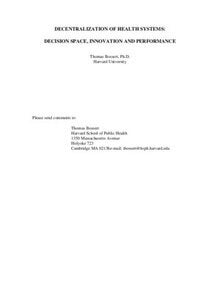Decentralization of Health Systems: Decision space, Innovation and Performance

|
Decentralization has long been advocated as a desirable process for improving health systems. Recently, it has been seen as an integral part of broader health reforms to achieve improved equity, efficiency, quality, and financial soundness. Nevertheless, we still lack a sufficient analytical framework for systematically studying how decentralization can achieve these objectives. We do not have adequate means for analyzing the three key elements of decentralization:
|
